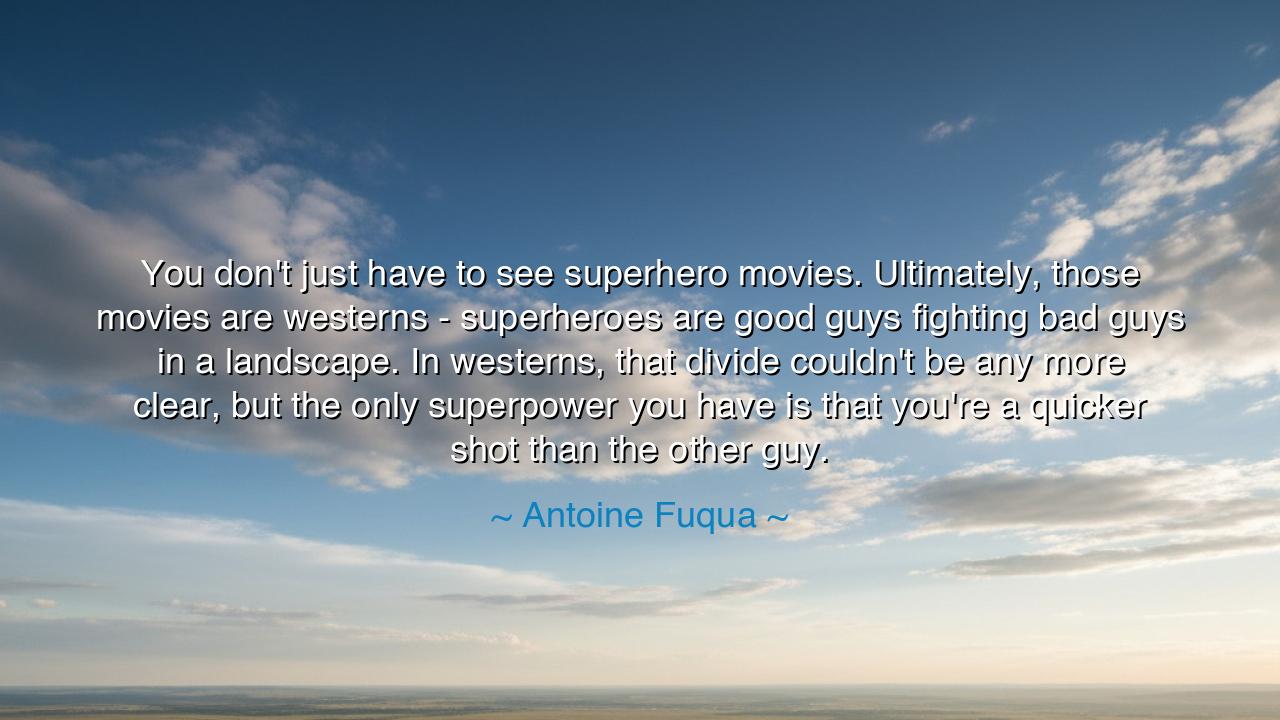
You don't just have to see superhero movies. Ultimately, those
You don't just have to see superhero movies. Ultimately, those movies are westerns - superheroes are good guys fighting bad guys in a landscape. In westerns, that divide couldn't be any more clear, but the only superpower you have is that you're a quicker shot than the other guy.






Hear now, O Seekers of Wisdom, the words of Antoine Fuqua, who speaks of the deep connection between the superhero genre and the ancient traditions of storytelling: "You don't just have to see superhero movies. Ultimately, those movies are westerns—superheroes are good guys fighting bad guys in a landscape. In westerns, that divide couldn't be any more clear, but the only superpower you have is that you're a quicker shot than the other guy." In this statement, Fuqua unravels a profound truth about the nature of the stories we tell—how the hero's journey, whether in a cape or on horseback, has always been defined by the battle between good and evil. He reminds us that while the superhero may possess extraordinary powers, they are, at their heart, not unlike the cowboy—a lone figure who rides through a landscape where the lines between right and wrong are sharply drawn.
In the ancient world, the heroic narrative was often simple but profound—heroes were those who stood against the forces of chaos, often in the form of monstrous creatures or corrupt rulers, to restore order and justice. The Greek heroes, like Hercules, Achilles, and Perseus, fought not just for personal glory, but for the greater good of their people. They wielded strength, but more often than not, it was their courage and resolve that proved most powerful. Fuqua’s words remind us that the superhero—like these ancient figures—represents a modern evolution of the age-old struggle between the forces of good and evil. The landscape may have changed, but the battle remains the same.
Consider, O Seekers, the rise of the Western genre. Like the ancient epic, the Western is a timeless story of the lone hero who arrives in a land filled with uncertainty and moral ambiguity. In westerns, the hero often possesses no supernatural abilities; rather, his strength lies in his wits and his skills. Take, for example, Clint Eastwood’s portrayal of The Man with No Name, a character whose power comes not from his strength or speed, but from his ability to outdraw his opponents with a single, decisive shot. The divide between good and evil is made clear in these films, much like in superhero films, but here, the battle is often fought with fists and guns, not superhuman powers. The Western hero, like the superhero, must navigate a world that teeters between chaos and order, but ultimately, they both fight for justice.
The superhero, however, introduces a modern twist to this timeless tale. While the Western hero relies on his quick draw, the superhero often wields incredible power, from super strength to flight. Yet, as Fuqua rightly points out, the essence of both is the same: good guys against bad guys. In the age of the superhero, we are reminded that these characters are more than just figures of strength or abilities; they embody the same ideals that shaped the ancient hero’s journey. Their powers may be extraordinary, but it is their sense of duty, their resolve, and their willingness to stand for what is right that makes them heroes.
In our own lives, O Seekers, we can draw much from both the Western and the superhero archetypes. The superhero may possess the powers of the gods, but it is his or her choices—the courage to act in the face of overwhelming odds—that define them. Heroes, in all their forms, remind us that it is not the power we possess, but the wisdom to wield it for the good of others that truly matters. The Western hero, though seemingly less endowed with miraculous gifts, shows us that even the smallest of us, armed with courage and integrity, can stand up to evil and wrongdoing.
Just as Hercules fought the Hydra or Achilles faced the Trojan forces, so too must we confront the challenges of our time. The battle may not always be against mythical beasts or corrupt kings, but against the forces of injustice, disharmony, and despair. Whether we are called to fight with our strength or our mind, with compassion or resolve, the true lesson of both the superhero and the cowboy is that good can prevail, if only we rise to the occasion. As Fuqua reminds us, the hero’s journey—whether on horseback or in a cape—is the same: it is the eternal struggle of good against evil in a world that needs both.
So, O Children, let this be the lesson passed down through the ages: do not measure your strength by the powers you possess, but by the choices you make in the face of adversity. Like the heroes of the West, who relied on quick thinking and courage, or the superheroes who wield their powers for the sake of others, know that the true strength of a hero lies in their willingness to face evil with honor and purpose. Whether you face dragons or the darkness within, remember that it is not the size of your abilities, but the heart with which you wield them, that will define your legacy.






AAdministratorAdministrator
Welcome, honored guests. Please leave a comment, we will respond soon